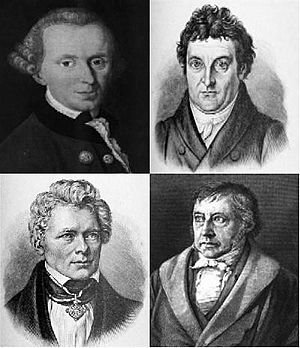German idealism facts for kids
German idealism was a major way of thinking in philosophy. It began in Germany during the late 1700s and early 1800s. This period was also known for the Age of Enlightenment and the French Revolution. German idealists believed that our knowledge of the world comes from our mind. They thought that what we know about the outside world is shaped by our own experiences. Famous thinkers like Immanuel Kant, Georg Wilhelm Friedrich Hegel, Johann Gottlieb Fichte, and Schelling were key figures in this movement.
Contents
What is German Idealism?
German idealism is a set of ideas about how we understand reality. These philosophers believed that our minds are not just passive receivers. Instead, our minds actively shape what we know and experience. They thought that the world we see and understand depends on our thoughts and ideas.
The Role of the Mind
A main idea in German idealism is that nothing exists without the mind. This means that our thoughts and consciousness are very important. They believed that our minds help create our reality. It's like our brains are not just cameras. They are also like artists, painting the picture of the world we see.
Knowledge and Experience
German idealists explored how we gain knowledge. They argued that our knowledge about the world is limited. It is limited to what we can experience. We cannot know things that are completely outside our experience. This idea changed how people thought about truth and reality.
Key Thinkers of German Idealism
Several brilliant philosophers led the German idealism movement. Each added their own unique ideas. They built on each other's work, creating a rich and complex philosophy.
Immanuel Kant
Immanuel Kant (1724–1804) was a very important philosopher. He is often seen as the starting point for German idealism. Kant argued that our minds have certain structures. These structures help us organize our experiences. For example, our minds understand things in terms of space and time. We also understand cause and effect. These are not just features of the world. They are ways our minds make sense of the world.
Kant believed we can't know things as they are "in themselves." We only know them as they appear to us. This is because our minds always process and shape our experiences. His ideas greatly influenced the philosophers who came after him.
Johann Gottlieb Fichte
Johann Gottlieb Fichte (1762–1814) was a student of Kant. He took Kant's ideas even further. Fichte believed that the "I" or the self is the most important thing. He thought that our own consciousness creates our reality. He argued that everything we experience comes from the activity of our own minds. This made the individual's mind central to understanding the world.
Friedrich Wilhelm Joseph Schelling
Schelling (1775–1854) was another key figure. He focused on nature and art. Schelling tried to show how the mind and nature are connected. He believed that nature is not separate from the mind. Instead, it is an expression of the same underlying spirit or force. He thought that art could help us understand this connection.
Georg Wilhelm Friedrich Hegel
Georg Wilhelm Friedrich Hegel (1770–1831) is one of the most famous German idealists. He developed a complex system of thought. Hegel believed that history is a process of ideas developing over time. He thought that everything is part of a single, evolving spirit. This spirit tries to understand itself. He called this process "dialectic." In a dialectic, an idea (thesis) meets an opposing idea (antithesis). This leads to a new, better idea (synthesis). Hegel's ideas influenced many later philosophers and political thinkers.
Impact of German Idealism
German idealism had a huge impact on philosophy. It also influenced art, literature, and politics. It changed how people thought about the mind, reality, and history. Many later philosophical movements were either inspired by or reacted against German idealism. It remains an important part of understanding modern philosophy.
See also
 In Spanish: Idealismo alemán para niños
In Spanish: Idealismo alemán para niños
 | May Edward Chinn |
 | Rebecca Cole |
 | Alexa Canady |
 | Dorothy Lavinia Brown |


